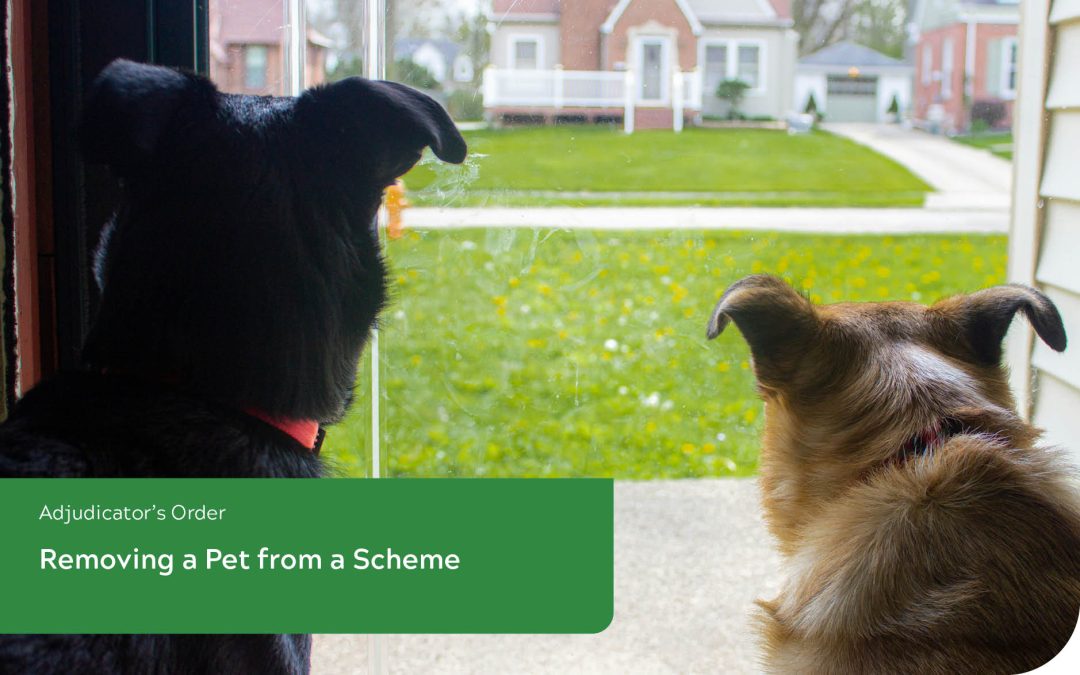Readers may have personally experienced the stress associated with hearing a barking dog late or night or every time neighbours pass the dog’s front door within a body corporate. It is hard not to worry about an animal who is perhaps without their human companion for extended periods of time and barking accordingly.
All of these concerns raise questions like “how much barking is too much barking” and “is constant barking enough to allow the Committee to require the dog be removed from the scheme”?
In a recent case before Adjudicator Walters, “constant barking” was considered in the context of a standard noise by-law and nuisance under the Act.
For those unfamiliar – many body corporate schemes have a noise by-law which looks similar to this:
“1. Noise
1.1 An owner shall not make or permit any noise likely to interfere in anyway with peaceful enjoyment of other owners of lots or of any person lawfully using the common property. In particular, no owner of a lot shall hold or permit to be held any social gathering in his lot which would cause any noise which could unlawfully interfere with the peace and quiet of any other owner of a lot, at any time of the day or night and in particular, shall comply in all respects with the Noise Abatement Act 1979, as amended”
The nuisance provision under the Act looks like this:
“167 Nuisances
The occupier of a lot included in a community titles scheme must not use, or permit the use of, the lot or the common property in a way that—
(a) causes a nuisance or hazard; or
(b) interferes unreasonably with the use or enjoyment of another lot included in the scheme; or
(c) interferes unreasonably with the use or enjoyment of the common property by a person who is lawfully on the common property.”
Now onto the facts of the case……..
In mid-September 2022 the Respondent in the case sought approval from the body corporate to move into the scheme with her female toy poodle, Charlie. Approval was granted by the Body Corporate (acting through the Committee) and one of the terms of the approval was for Charlie to be restrained from making noise sufficient to disturb the enjoyment of the lots and common property by other occupiers.
Subsequenlty, the Committee alleged it received complaints about Charlie barking “constantly” and subsequently the Committee resolved to rescind the approval for Charlie to remain at the scheme on 3 March 2023.
The body corporate filed its application and requested an order for Charlie to be removed from the scheme following unsuccessful conciliation.
In its application material, the body corporate alleged it had:
- Received complaints by the owner of lot 4 (also the Chairperson) of Charlie’s barking;
- Received complaints from the building managers of the neighbouring scheme about Charlie’s barking;
- Received a complaint from the co-owner of Lot 16;
- Received recordings of Charlie’s barking;
- Received a complaint from Lot 4 of Charlie’s barking – Lot 4 owner knocking on the door to speak to Charlie’s owner and receiving no response.
The body corporate’s evidence was essentially that Charlie’s barking was “constant” and no specific log of dates and times could be produced by the complainants.
When Charlie’s owner requested details of the complaints made and when the Commissioner’s office requested copies of footage – the only footage provided was accepted by the Adjudicator as Charlie barking three times in a seven second video clip.
To assist in Charlie’s case, Charlie’s owner rather wisely set up a google camera within her unit to record Charlie barking and later produced that evidence to the Adjudicator – which was accepted.
Looking at the google camera footage, the Adjudicator found that Charlie barked 85 times between 6.34pm and 8.08pm on 2 March 2023 – potentially triggers by Lot 4 owner ringing the doorbell.
The Respondent submitted that whilst Charlie did bark – Charlie’s barking amounted to less than six (6) minutes in any hour and less than the nuisance set out in section 34 of the Gold Coast City Council Local Law No 12 (Animal Management).
Finally the Respondent sought and obtained written statements from nearby Lots 8, 9 and 12confirmign that they do not hear Charlie barking and Charlie does not unreasonably interfere unreasonably with their use and enjoyment of their lots.
Ultimately the Adjudicator refused to order Charlie’s removal from the lot and dismissed the Application.
The takeaway from this case is that evidence is king. Unsupported, emotive and unsubstantiated allegations will not trigger the outcomes sought.
Here is a link to the complete case: https://classic.austlii.edu.au/au/cases/qld/QBCCMCmr/2024/89.html
